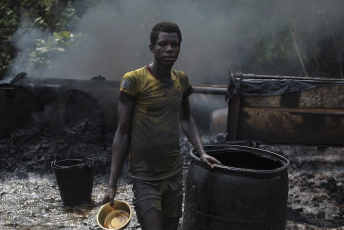Ethiopia is the epicentre of irregular migration from Eastern Africa. It is both an origin and transit state, with international organisations estimating that hundreds of thousands of Ethiopians leave the country annually. Facilitating this movement is the socially embedded nature of irregular migration supported by organised network of criminal actors working across the region and on to destination states.
Mixed migrants – comprising refugees, asylum seekers, and migrants with different legal statuses and multiple vulnerabilities who are escaping poverty or persecution – often leave or transit across Ethiopia via three main routes of irregular migration. The southern route is via Kenya to South Africa and North America, the north-western route via Sudan to Libya and Europe, and then the eastern route via Djibouti and Somaliland to the Middle East.
Recently Ethiopia has made strides towards countering the crimes of trafficking in persons (TIP) and smuggling of migrants (SOM). In April 2020, Ethiopia brought into force Proclamation No. 1178/2020 that provides for the prevention and suppression of TIP and SOM. The proclamation has established a high-level council, chaired by the deputy prime minister, to spearhead the country’s response to TIP and SOM.
A National Partnership Coalition (NPC) for the prevention and control of the crimes of TIP and SOM has also been convened. In collaboration with the International Organization for Migration (IOM), the NPC is preparing a national migration policy that deals with TIP and SOM at the policy level.
Furthermore, the Attorney General’s Office is developing a specific strategy for the prevention of TIP and SOM. This is a first-of-its-kind effort, given that no other crime has a specific prevention strategy in the Ethiopian criminal justice system. The office has already produced, in early 2021, Standard Operating Procedures to ensure quality and uniformity in the investigation and prosecution of TIP and SOM.
Demonstrating a growing political will, such efforts could also contribute to the more effective prosecution of TIP and SOM in Ethiopia. There is currently a low level of conviction for both crimes. The NPC reports that of 2 332 investigations carried out by the police from July 2018 to July 2020, only 566 cases had resulted in the conviction of defendants while 596 cases were still pending. The rest have been discontinued, largely due to the unwillingness of witnesses to testify.
This reluctance to testify is not just a result of fear of retaliation from traffickers and smugglers. It’s largely because communities do not see TIP and SOM as crimes that merit a law enforcement intervention, says Inspector Eshetu Erga, head of the TIP and SOM Investigation Division at the Federal Police Commission.
Dr Tekalign Ayalew, a migration researcher at Addis Ababa University, concurs, explaining that the social and cultural embeddedness of irregular migration may be an impediment to effective criminal prosecution.
Indeed, in Hadiya, a migration hotspot in southern Ethiopia, parents reportedly force their children to leave the country for South Africa. The Ethiopian police say that it is often difficult to distinguish a smuggler or trafficker from any other member of the community in Tog Wajaale, a town on the Ethiopia-Somaliland border. It is common knowledge in Ethiopia that a victim of trafficking or smuggling may return to Jimma (in the west) or Wollo (in the north) to help smuggle a relative or a neighbour to the Gulf countries.
Habetamu Haile, who coordinates the Attorney General’s prosecutions for TIP and SOM, explains that the crimes are often carried out by families of victims or trusted community members, some of whom have ties to organised criminal groups. He and several other experts consider community education as essential to winning the battle against TIP and SOM.
Awareness-raising appears at the top of the list of strategic goals proposed in the Attorney General’s Office’s draft strategy for the prevention of TIP and SOM. Eyoel Demessie, a senior expert at the IOM Ethiopia, points out that the IOM has already been running community dialogue sessions in selected rural communities.
Yet the effectiveness of awareness-raising efforts is questionable. According to Abel Gebregzihaber, NPC coordinator, ‘had awareness-raising campaigns been effective, Ethiopian youth could have already dropped the belief that they can travel to Arab countries and literally dig out money’. A recent IOM survey revealed that about 70% of Ethiopians immigrating via the Eastern route were unaware of the war in Yemen.
If awareness-raising is to bring real change, Ethiopia might need to address two important issues. Firstly, the government needs to own and enhance awareness-raising activities.
The Attorney General’s Office and the Ministry of Labour and Social Affairs do engage in awareness-raising activities aimed at countering TIP and SOM. Yet their efforts are less coordinated and rarely target the rural community, explains Endalkachew Worku, director of Legal Awareness, Education and Training at the Attorney General’s Office.
The activities often take the form of sporadic campaigns that lack continuity. Judge Tesfaye Neway, vice president of the Federal First Instance Court, argues that community education should be enhanced and supported with research and evidence such as that identified in criminal proceedings.
Gebregzihaber notes that ‘existing awareness-raising efforts are donor-based where budget is rarely allocated by regional or federal governments.’ Eyoel is concerned that the lack of budgeting and commitment threatens the continuity of the community dialogues, which have been carried out with the expectation that the government would step in to sustain and scale them up.
Secondly, although essential in sensitising the community against irregular migration, awareness-raising should not be seen as a silver bullet. Ethiopian migrants often decide to make the risky journey, fully aware that it is a criminal enterprise and is often extremely dangerous.
This means that it is critical for the draft strategy and national migration policy to address the myriad factors driving TIP and SOM in Ethiopia in order to provide a comprehensive and effective policy response.
Tadesse Simei Metekia, Senior Researcher, ENACT, ISS Addis Ababa







